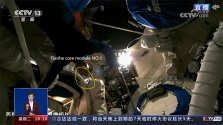You are using an out of date browser. It may not display this or other websites correctly.
You should upgrade or use an alternative browser.
You should upgrade or use an alternative browser.
China's Space Program Thread II
- Thread starter Blitzo
- Start date
Not sure uf that is possible giving that timeline. Plus the rocket itself is still underdevelopment. Seriously looking at how cautious CNSA functions i doubt they can achieve this before 2030 giving all the stages needed to even get close to launching humans to the moon for the first time by China. But I'm sure we will all be happy to be proven wrong. They might surprise us.I watched the broadcast and CCTV interviewed a department head (crew module?) and she spoke about the CZ-10 timeline. She first reiterated that the moon landing date is before 2030 then she said the CZ-10/next-generation crew module will follow a similar test schedule as the CZ-2F/Shenzou series. Specifically, she counted SZ Missions 1, 2, 3, 4, and 5. If we assume the landing will happen on the second crewed flight with the first flight orbiting the moon, we are talking about 6 CZ-10 launches before 2030. We are only 6 1/2 years away from 2030 so it sounds like the first unmanned CZ-10 launch should happen around 2025? Perhaps three test flights instead of four? Reasonable?
Shenzhou 1 was launched in November 1999, Yang Liwei rode Shenzhou 5 in space October 2003. That is 4 years. In comparison, the new capsule has already had its first launch equal to Shenzhou 1. So there are only three launches (3 years) left before crewed launch.I watched the broadcast and CCTV interviewed a department head (crew module?) and she spoke about the CZ-10 timeline. She first reiterated that the moon landing date is before 2030 then she said the CZ-10/next-generation crew module will follow a similar test schedule as the CZ-2F/Shenzou series. Specifically, she counted SZ Missions 1, 2, 3, 4, and 5. If we assume the landing will happen on the second crewed flight with the first flight orbiting the moon, we are talking about 6 CZ-10 launches before 2030. We are only 6 1/2 years away from 2030 so it sounds like the first unmanned CZ-10 launch should happen around 2025? Perhaps three test flights instead of four? Reasonable?
Besides I don't quite understand the technical purpose of crewed fly-by. I suspect that NASA's fly-by mission is a budget issue of money-must-be-spent-in-fixed-lot and meeting congress' demand of "show me what you are doing", not really technical. Example is the orion test, 1st without a working service module because of delay, but even if not, SLS was late too, then a fly-by mission. They could have been done in one go if everything is on schedule instead.
Apollo CSM only started development in 1961, first launched 1966 and the block II version was launched in 1968. Saturn V design was chosen and started development in 1962 and first launched in 1967. China isn't exactly behind schedule compared to US.Not sure uf that is possible giving that timeline. Plus the rocket itself is still underdevelopment. Seriously looking at how cautious CNSA functions i doubt they can achieve this before 2030 giving all the stages needed to even get close to launching humans to the moon for the first time by China. But I'm sure we will all be happy to be proven wrong. They might surprise us.
It seems to me that an unmanned flight may make sense if the manned spacecraft and the lunar module are ready. Check all docking systems in lunar orbit. The module can perform landing operations by descending to a certain height. People will follow the already known path.Shenzhou 1 was launched in November 1999, Yang Liwei rode Shenzhou 5 in space October 2003. That is 4 years. In comparison, the new capsule has already had its first launch equal to Shenzhou 1. So there are only three launches (3 years) left before crewed launch.
Besides I don't quite understand the technical purpose of crewed fly-by. I suspect that NASA's fly-by mission is a budget issue of money-must-be-spent-in-fixed-lot and meeting congress' demand of "show me what you are doing", not really technical. Example is the orion test, 1st without a working service module because of delay, but even if not, SLS was late too, then a fly-by mission. They could have been done in one go if everything is on schedule instead.





















